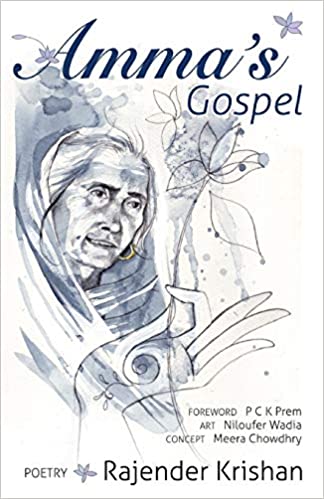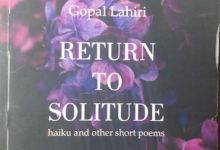Bhaskaranand reviews Amma’s Gospel by Rajender Krishan, exclusively for Different Truths.

India’s greatness as a literary and cultural nation is commonly believed to be ingrained in the conventional excellence of scriptural affluence, spirituality, mysticism, and philosophy, in addition to many more. Oriental philosophy, particularly Vedantic philosophy – Vedas, Upnishads – finds acceptance and relevance with reverence even in the expanding realm of modern science, particularly Quantum Physics. The troika of the spirit, intellect and lifeforce thrives in either domain of knowledge and wisdom for their betterment, unification, and harmony.
Indian literature feels pride in the age-long tradition of devotional songs and metaphysical musings. Instances are galore…
Indian literature feels pride in the age-long tradition of devotional songs and metaphysical musings. Instances are galore; they can be seen even in the regional literatures of India. In addition to devotional writers, Vidyapati, Kabir, Surdas, Tulsi, Meera Bai, Raskhan and so on, Aurobindonian school of spiritual and mystical poetry is supposed to have given a different dimension to this sort of writing in Indian English Poetry to a considerable extent.
In the contemporary stream of eternal devotional and spiritual writings Rajender Krishan, a New York-based Indian-American poet, gets his name studded with celestial light of emancipatory illumination, by virtue of his debut poetry book “Solitude and other poems” and the recent book of gospels, entitled Amma’s Gospel, which is a vivid account of the poet’s journey through the spiritual introspection to divine realisation. He takes us with him, through his poetry, in the world of metaphysics and devotion from the mundane reality of existence. The poet has adroitly used his ‘Amma’ as a metaphor of beauty, patience, experiences, insights, devotion, introspection and hope of Indian lore and learning, trove of scriptural treasure and most importantly, inner conscience of man.
Rajender Krishan’s Amma’s Gospel is a collection of forty-five evocative reflective, philosophical, devotional, and mystical poems…
Rajender Krishan’sAmma’s Gospel is a collection of forty-five evocative reflective, philosophical, devotional, and mystical poems, which highlight the importance of spirituality in human life. These poems, soaked in spirituality and mysticism, revolve round eternal themes of mysteries of life, death, cessation, and rebirth, renunciation, and salvation. In addition, it also offers resolutions to the contemporary complex problems of human life.
What is more remarkable about the present collection is that the poems are like the gospels – pearls of wisdom; profound truths, couched in charged words of spirituality and philosophy which open a new vista on us. With a serious reading of the poems, readers are sure to feel fulfilled, elevated, revived, and enriched. The titles of all poems are well chosen echoing the poetic and objectified essence and authorial intention. The book is the outcome of his subjective take on existential dilemma resolved by his insightful Amma with her oft-sought relevant guidance. The poet seems to be celebrating fond memories of his grandmother in whose memory the book is dedicated as a humble tribute. The poet reveals:
“Whenever I am confronted with a dilemma, I end up invoking Amma (my paternal grandma – Shrimati Ratan Devi: 1900-1982). I invariably get answers to the questions and also her guidance to deal with the difficult situations in life. As a humble tribute, this collection contains several poems where I have reflectively reminisced Amma, in an attempt to appreciate her fond memories and seeking her forever relevant guidance”.
What is unique about the book is that it embodies the pictorial presentation of illustrations that aptly describe each and every poem.
What is unique about the book is that it embodies the pictorial presentation of illustrations that aptly describe each and every poem. These wonderfully crafted illustrations make the poems comprehensible and enjoyable indeed. And for this Niloufer Wadia deserves accolades. She has beautiful eyes and hand to pen a poetic mind!
The book opens with the invocative poem “Om”, sacred and spiritual sound, which is symbolic of ‘primordial energy’. Like a man with spiritual bent of mind seeks the blessing of God before he undertakes a journey, Rajender ji also, before he shares his insights with us, chants and paints in words the inexplicable power of this cosmic sound-
Om The Only Verse Manifesting eternally The Universe (page 33)
He further offers his salutations through the poem ‘Namaste’, to the One ‘That pervades the entire Cosmos’. He has deep reverence for the sacred space of divinity that houses ‘The very Cause of Life’. The poemresounds the symphony of love, light, truth, harmony, enriching humility, compassion, fortitude that God endows us with, in times of solitude.
Amma is central to his poetic reflection and creativity. She is a metaphor, a symbol that he uses for expression of his philosophy of life that he has learnt in his life.
Amma is central to his poetic reflection and creativity. She is a metaphor, a symbol that he uses for expression of his philosophy of life that he has learnt in his life. His Amma ji is a simple, God-abiding lady who has not forgotten to follow Indian style of living even after facing colonial subjugation and suppression though she gained independence/ only to become a refugee, / a migrant in her own country/ in the post-partitioned India. This is how the poet introduces his grandmother to his readers. Scenic beauty of evening housing her aroma is still felt around the poet who captures social, countryside and innocent rituals performed in Indian society:
Lighting the diya for the daily Aarti Offering gratitude, seeking fortitude Amma would engrave in our ambience the Principle, that transforms even today into a blessed and enthralling epoch each time she walks down my memory lane. (page 37)
The poet still remembers her saying, her explanations given in all contexts and the didactic lesson imparted to him. Following extract as part of great lesson of life taught to the poet by his Amma is expressive of Indian cultural and spiritual ethos-
Love yourself by being true to yourself Be not in haste to react First anticipate then contemplate and then respond Follow the right path Be happy Be successful. ( Greetings/ page 41)
‘Leela’ is another beautiful poem dealing with the supreme power of control – ‘The Master Puppeteer’!
‘Leela’ is another beautiful poem dealing with the supreme power of control – ‘The Master Puppeteer’! He describes this unified field of divinity as, ‘Invisible and mysterious, as if nowhere, while effectively being here, always within from birth to death’. People who want to get connected with Him are born and wander only to find a soothing place in His heart. He remarks:
the cosmos of Life — in this eternal Leela — wanders ad infinitum in search of the miraculous here, there, and everywhere. ( page 43)
‘Amma’s Gospel’, the titular poem, is deep and insightful in many ways. It is at the same time simple, elaborating, and responsive with her classic, didactic and encapsulating vignette. She explains to the poet the repercussion of ‘the path of deceit’:
Stop electing the path of deceit in the journey of life The path of deceitfulness makes you the key contestant against your very own self while cruising through the vagaries and variables in the play of life Further, The sham and deviousness of playing blame games makes you a gadget of ego that traps and ensnares leading to a fraudulent integrity of tumbling self-esteem unable to see its very own reflection
‘Why Pray?’ underlines the power of prayer. She explains like a seer that offering and showing gratitude, through prayer, ‘brings fortitude…
‘Why Pray?’ underlines the power of prayer. She explains like a seer that offering and showing gratitude, through prayer, ‘brings fortitude/ With a yearning to be in His Grace.’ Most importantly, her sermon ends up with beautiful lines –
Do not hanker, despise greed Let other riches seek you And remember always You get what you deserve Only when it becomes due (page 50)
In the poem “Cyclical”, the poet attempts to reiterate the eternal cycle of creation, sustenance, and destruction, termed as ‘Leela’. Indeed, ‘cycle of physical birth and death is a subset of a larger cycle of Nature. All that happens in the world or life is the game plan of Prakriti and Purusha. Amma calls this a mere play the inexorable Leela. The poet writes of this leela as:
incomprehensible plan encompassing all laws of physics and chemistry in the form of Sattva, Rajas and Tamas as the trinity of creation, sustenance and destruction manifesting eternally from the unknown Energy that has countless names (page 54-55)
The poet’s “Quest” and curiosity lead him to his Amma to seek the answer to yet another mystical question of ‘births and deaths’ and of course ‘salvation’. To understand all this saga, she suggests:
Be Silent and Listen* To what Life wants to say Meditate on the experience Get not attached Simply immerse Become the Witness Relax (page 58)
Further, Amma tells him that the quest will never come to an end; it will ever go on…
Further, Amma tells him that the quest will never come to an end; it will ever go on and explains to the poet –
All conceptual debates of birth, death, cycles, salvation known and unknown will adjourn and merge in the abyss of silence The Leela will march on with the vibrance and radiance of its own glory (page 59)
The poem “Word” reveals the power of words. Spiritually speaking , chanting of just one word would prove the key to unlock the supreme potential within, that encapsulates the absolute existence. That’s why she explains:
Be it any word its several layers concealed within connect to other words forever expanding as the tree of life (page 62)
The poem “Amma”, a poem of memory and reflection, sums up the values and ideas…
The poem “Amma”, a poem of memory and reflection, sums up the values and ideas, traits of Amma, an epitome of good and pious qualities of life, human pathos, Indian ethos, feminine insights etc. The poet takes pride in recalling her ‘lullabies’, ‘nurturing’, ‘parathas’, ‘command’, ‘generosity’, ‘spirituality’ and ‘mysticism’. She was really much more ‘caring’.
Even during the Pandemic time, the poet acts on the gospels of Amma to deal with the unprecedented situation. The poem ‘Healing’ is a testimony to the fact that each of her wisdom-drenched words has a therapeutic impact on the poet- befriending the death and self-control and internal discipline. She mentions Patanjali’s yoga sutras and initiates him —
TO BE: clean, committed, content, honest, kind, loyal, non-violent, persevering, poised and tolerant, and NOT TO BE: a cheat, greedy or a thief. (page 72)
Amidst the life leading words of Amma, the poet also remembers the wise words of his father who gives him the lesson of parenting.
‘Connection’ bespeaks of the ‘serenity of her silence’ while ‘her deep eyes talk conveying much’. Amidst the life leading words of Amma, the poet also remembers the wise words of his father who gives him the lesson of parenting. In “Destination”, the poet tends to recall his nuggets of wisdom –
Parenting is nothing but a path which changes generation after generation but never the destination. The destination always is emancipation of the Self. (page 84)
While “Poise” talks of taming the wild impulses- ‘in all humility grows strong/ to reign the wild horses/ galloping in mind’s racecourse’, “Shiva”, on the other hand, symbolically represents and advocates co-existence. The poem “The Present” is an incisive poem which attempts to define the time with a new metaphor –
Bound in the limits of Time, Space and Causation The perception of the present the natural gift from God remains perpetually camouflaged within the diurnal shades (page 95)
Imbued with the ethos of Sufism, the poem is simple but spiritually powerful and soul-uplifting.
“Gurdwara” is Kabiresque in content and intent. Imbued with the ethos of Sufism, the poem is simple but spiritually powerful and soul-uplifting. The poem makes a trigonometry of thoughts, endeavors, and devotion, finally leading to salvation of soul –
The realisation The attainment − will simply be – the primordial energy the sound of the silence (page 104)
“Nature” unravels the mysteries of duality of existence and life and calls the process- two sides of the same coin, thus eulogising the divine oneness of all objects of nature and the emotions.
as an eternal recurrence thereby manifesting Life of cyclic seasons in the pairs of opposites Love and hate heaven and hell joy and sorrow birth and death … as the obverse and reverse of the same coin One is amazed by this duality as the singularity of Oneness that the Gurus talk about (page 113)
“The Mystic” qualifies a mystic in terms of many acts of human life –
Desire compels learning to accumulate something; The mystic by unlearning evolves to arrive at nothing (page 113)
“Impetus” is remarkable for the beautiful definition of a karmayogi –
who doesn’t get daunted, but accepts the surfacing challenges and strives dedicatedly to overcome the obstacles, is actually the true Karma Yogi (page 117)
“Life” redefines life with noble symbols and metaphors.
“Life” redefines life with noble symbols and metaphors. The poet says that’ Life is the only constant/ that is forever changing/ This four-letter word/ encompassing dynamic vibrance/ mysteriously challenging.’ The poem ends with a beautiful and mystical note –
Life - the eternal mystic moves on with its own conundrum of paradoxes, riddles, puzzles in myriad hues of vagaries and variables. (page 121)
‘Heaven and Hell” is a beautiful poem which deals with the philosophical construct of mythological heaven and hell. The poet regards it a state of mind or temperament of ‘one’s own persona’. He gives it a new meaning and remarks:
If welcomed with hugs and smiles sweet home is the heaven reflecting one’s virtues and good deeds Instead, if nagged and neglected - wretched hell is the house mirroring one’s cruelty immorality and misdeeds (page 139)
The beautiful anthology ends with “Renunciation” giving birth to the divinity of the soul.
The beautiful anthology ends with “Renunciation” giving birth to the divinity of the soul. It alludes to the emancipatory process of transformation from seen to unseen, from gross to subtle, from the death of the body to the deliverance of the soul from the existential bondage.
Accepting with gratitude whatever life bequeaths to become burden free of all likes and dislikes One, fearless of any loss or worrisome of any gain immerses in pure relaxation, until the vacation is over (page 149)
He senses ‘fragility of life’. He is now under realisation of transitory stay in this world. With this insight he reiterates that everything of life, however valuable it may be, finally becomes trivial and valueless. The lifelong bondage gives way to the ultimate truth of life. No fear, loss, gain stays permanently; they are lost and immersed in the ocean of eternity. And Soul with the Supreme Soul.
To sum up, with Amma’s Gospel, Rajender Krishan, the poet seems to have extended the frontier of poetry by carrying forward the flag of ancient Indian tradition of profound spiritual, philosophical, mystical, devotional heritage and cultures. His experience is dense, and the expression is lucid. His observation of human life and predicament, his rumination over life and death, his utterances of profound wisdom, philosophical effusion, his articulation of spiritual quest, his intense longing to belong to the realm of divinity, his glorification of a human figure as a beacon of devotion, with keen insights into spirituality and mysticism are the distinct qualities of the book.
He undertakes an inner voyage from the material and corporeal world of senses to the celestial realm of self-awareness, and purity of soul.
He undertakes an inner voyage from the material and corporeal world of senses to the celestial realm of self-awareness, and purity of soul. His quest leads him and his self to soul – self-realisation. As the apex of his spiritual experiences and metaphysical musings, his poetry has a powerful undercurrent of universality of appeal for those who wish to explore meaning of existence and search for the identity.
Works cited:
Krishan, Rajender. Amma’s Gospel, Setu Publications, 2021.
Photo sourced by the reviewer and visual by Different Truths





 By
By
 By
By
 By
By
 By
By